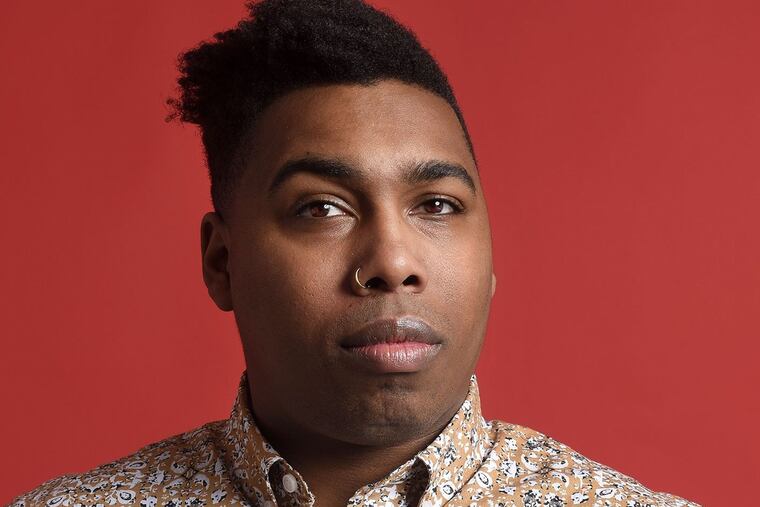Saeed Jones, hot poet and former BuzzFeed news host, stops in Philly on debut book tour
Jones is the award-winning author of "How We Fight for Our Lives," a memoir about growing up black and gay in Texas. He also hosts BuzzFeed's morning Twitter news show, AM2DM.

Last month, poet and author Saeed Jones sat anxiously at the Kirkus Prize ceremony in Austin, Texas. His memoir, How We Fight for Our Lives, had been nominated in the nonfiction category for the prestigious literary award, which includes a $50,000 check.
When his name was called as one three Kirkus winners — along with Colson Whitehead (the fiction winner, for The Nickel Boys) and Jerry Craft (the young readers’ literature winner, for New Kid) — “my mind just went blank,” Jones said. As he made his way to the front of the room to accept his award, the only word that came to his mind was gratitude, a trait his late mother taught him.
How We Fight for Our Lives gives readers an unabashed view of growing up black and gay in Texas in the 1990s, from Jones’ precarious relationship with his grandmother to the death of his mother, with whom he was very close. His book is lyrically emotional and vulnerable throughout.
Jones, 33, was also until recently host of BuzzFeed’s morning Twitter news show, AM2DM. He visits the Free Library for a book talk on Tuesday.
He spoke with The Inquirer last week. This is a condensed transcript.
» READ MORE: Author Michael Arceneaux discusses religion, sex, and Beyoncé in new book ‘I Can’t Date Jesus’
Was there a type of reader you had in mind when you were writing the book?
I try to write to myself. Early on in the first chapter, there are two moments when you see me pulling books from a bookshelf — at the library and at home. We see the power of those moments: what it feels like when you’re able to identify with work, and when you feel distant from the work. When I was writing the book, I was writing to the younger version of myself.
From the book, we learn just how close you and your late mother were. Was it difficult to write about her in such detail?
Writing about her in detail was a source of joy and it allowed me to celebrate the nuances of my mother. I really wanted to develop her as a complex, complicated character because that was true to who she was.
When you say that you were raised by a black single mother in the South, oftentimes people who may not have had that experience jump to the ready-made stereotypes. So I found that focusing on the details — which is just good writing to me — was my way of pushing back on assumptions that could overtake her as a character.
I guess the only time it was especially difficult writing about her was when she was in the hospital. As I note in the book, the moment I walked into the hospital room, she was a stranger. She was already gone.
In Chapter 4, you write: “My grandmother and I, without knowing it, were basically following a script that had already been written for us. A woman raises a boy into a man, loving him so intensely that her commitment finally repulses him.” Unpack that.
There is a complicated relationship with gay men and women, period. But it’s certainly difficult to be a black woman in America charged with raising a black and gay boy. So I wanted to make space for that dynamic and that perspective.
I didn’t want to let my grandmother — or myself — off the hook for the hurt. My grandmother thought she was saving my soul, and if that aligns with your faith or philosophy, what could be a greater act of love? But through the intensity and the ferocity of love, you could create a toxic dynamic because you’re so invested that you don’t allow the other person to communicate what they want out of the relationship.
» READ MORE: ‘Queer Eye’s’ Karamo Brown talks returning to Philly, lessons of forgiveness
How has your family reacted to the book?
Before the book was published, I sent copies to my grandmother Mildred, my uncle Albert, and my mom’s sister, Aunt Celia. I told them I wasn’t looking for feedback. We weren’t going to re-edit and rewrite chapters. I just wanted them to have the opportunity to read the book before it became a public conversation.
My grandmother said she forgot to wash the dishes because she sat down to read it and just kept reading. She said it brought back a lot of memories. What I found to be profound was that she didn’t try to reframe it, she didn’t make excuses. It’s been a positive experience and it gave us opportunities to have candid conversations that I think we wouldn’t have had otherwise.
Your father was largely absent from the book. What’s your relationship like with him?
We don’t have much of a relationship. To not have a relationship is a relationship, I guess. I’m young, and this memoir had a pretty specific focus. As I continued to work on the book, it became clear that the relationships that it made the most sense to focus on were the formative relationships at that time. It was about the women in my family.
» READ MORE: Darnell L. Moore’s ‘No Ashes in the Fire’: Coming of age queer, male, and black
Author Appearance
Saeed Jones: How We Fight for Our Lives
7:30 p.m. Tuesday, Free Library, 1901 Vine St., free, 215-567-4341, freelibrary.org. Jones appears with Clifford Thompson, reading from What It Is: Race, Family, and One Thinking Black Man’s Blues.